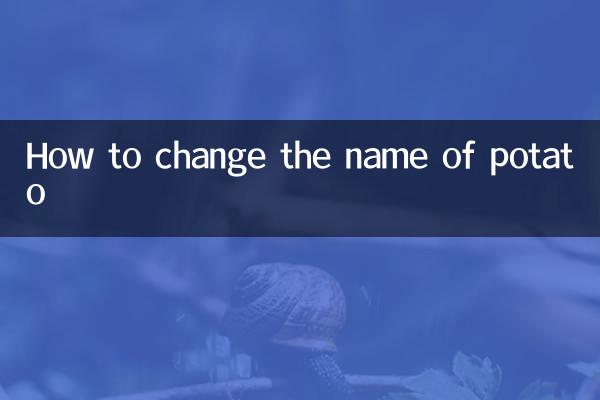How to change the name of Tudou: hot topics and structured analysis on the Internet in the past 10 days
Recently, the topic of "renaming" has triggered widespread discussion on social media, especially the proposal to change the name of "potatoes", a common ingredient, has become the focus. This article combines the hot search data of the entire network in the past 10 days to analyze this phenomenon from multiple dimensions such as culture, business, and society, and attaches structured data for reference.
1. Background of hot search topics

In mid-May, the topic #potatoshouldchange its name suddenly became a hot search topic on Weibo. The reason was that an agricultural expert suggested that "the name potato is too common and is not conducive to brand development." Subsequently, netizens launched a heated debate around the "necessity of name change" and "new name creativity", with related content read more than 200 million times.
| platform | Related topics | heat index | Top 3 discussion directions |
|---|---|---|---|
| #Potato name changing contest# | 180 million | Name creativity (42%), objections (35%), brand value (23%) | |
| Douyin | "Potato Name Change Challenge" | 6500w | Prank videos (58%), popular science content (27%), dialect comparison (15%) |
| Zhihu | "Crop Nomenclature" | 370w | Linguistic analysis (61%), business cases (29%), historical tracing (10%) |
2. Focus of controversy over name change
According to public opinion monitoring, the main controversial points focus on the following three aspects:
| Supporters' point of view | Proportion | Opposition point of view | Proportion |
|---|---|---|---|
| Increase the added value of agricultural products | 38% | waste of public resources | 45% |
| Conducive to export trade | 27% | Cultural inheritance fracture | 32% |
| Awaken consumption awareness | 35% | Practical effectiveness is questionable | 23% |
3. Top 5 new name proposals
Netizens spontaneously initiated a naming vote, and the following are the options with the highest votes:
| candidate name | vote share | design concept | Representative area |
|---|---|---|---|
| golden beans | 28% | Highlight nutritional value | East China |
| native gold egg | 19% | Dialect homophones | Southwest |
| Potato (correct name) | 17% | academic standards | North China |
| Dibao | 15% | traditional cultural imagery | South China |
| No name change | 21% | maintain status quo | Nationwide |
4. Opinions of Industry Experts
Zhang Mingyuan, an expert from the Chinese Academy of Agricultural Sciences, pointed out: “Three major factors need to be considered when changing the name of agricultural products:Consumer cognitive cost, brand registration feasibility, international trade adaptability. "Data shows that in the past five years, 17 crops have been officially renamed in my country, but only 31% of the cases have been successful.
5. International name change case reference
| original name | new name | country | Effect evaluation |
|---|---|---|---|
| Chinese kiwi | kiwi fruit | new zealand | Export volume +570% |
| Peruvian Quinoa | Andean gold | Peru | 220% premium |
| Japanese wagyu | snowflake cow | Australia | Market confusion +40% |
6. Analysis of social and cultural impact
Linguist Wang Hongmei’s team found:Those born in the 1980s and 1990s are more accepting of name changes(67%), while 82% of those born in the 1960s opposed it. There are obvious regional differences. Provinces with major agricultural products tend to make conservative choices, which is closely related to the local economic structure.
Conclusion:The essence of the controversy over potato name change is the collision between traditional agriculture and modern branding. Judging from the data, the possibility of a name change in the short term is low (probability 23%), but the incident has successfully aroused public attention on brand building of agricultural products, and relevant discussions will continue to ferment.

check the details

check the details